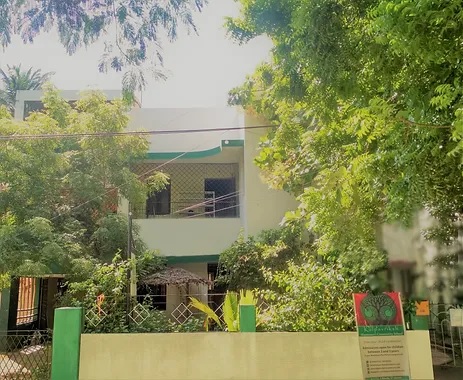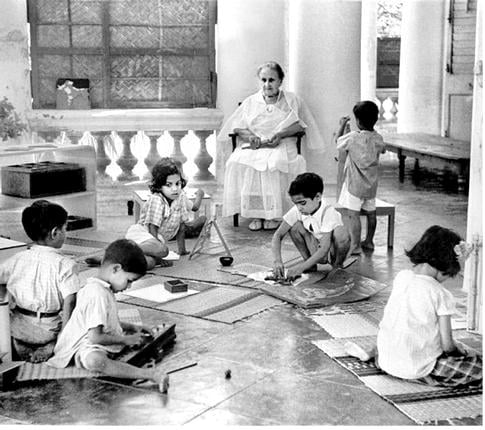About Kalpavriksh !!!

ABOUT
Our School
Kalpavriksh Montessori Community School was started under a different name in the year 2011 by Shri Vathsan Krishnan, an engineer-entrepreneur concerned about the lack of meaningful education opportunities for children around Anna Nagar. The school was set up in Anna Nagar West under the guidance of Ms Vishnu Priya, a Montessori teacher-trainer.
In the year 2016, when he wished to return to Bangalore, the parents and teachers of the school saw an opportunity to convert a business – albeit with a service motive – into a self-sustaining, cooperative effort to provide developmental-phase appropriate learning environments and opportunities for their children, based on the Montessori method. Parents, teachers and other concerned individuals decided to come together to mobilize resources to re-equip and take over the ownership and management of the school.
Kalpavriksh is now owned and managed by the Montessori Community Initiative, a public charitable trust. We are an IMC recognised school with IMTC/AMI trained staff. Currently, there are children aged 2 years and upwards.
The school continues to grow along with its children. We have adhered to Dr Maria Montessori’s philosophy that education is not something which the teacher does, but a natural process which develops spontaneously in the human being.
200
+Our Team
10
+Passout Students
20
+Combined Experience
2
+Branches
ABOUT
The Method
The Montessori method is a philosophy of education founded by Dr.Maria Montessori, an Italian physician and educator. The Montessori method is born from a long and professional observation of children. It is a time-tested and wonderful educational method, deeply respectful of each child, guided at all times by trained teachers, and develops the entire being of the child addressing the physical, mental, emotional, social, aesthetic and spiritual aspects.
The system also educates parents and caregivers and helps build ideal conditions for the child’s home and external environment.
Planes of development
All living systems construct themselves through processes of learning. A child too, grows, develops and matures into an adult through similar processes of learning, marked by the profound elation and joy of the learning experience.
The role of education, therefore, is to facilitate the flow of these natural learning tendencies in children. This was Dr. Maria Montessori’s (1870 -1952) seminal contribution to a fundamentally alternative, holistic pedagogy, developed through years of scientific observation of children coupled with the experience from classrooms she set up in various parts of the world, including Chennai that she conceived of education as an ‘aid to life’ that must follow as closely as possible to the needs of the growing child.
The Montessori perspective on the developmental stages that all human beings go through from infancy to adulthood, describes a series of formative planes or phases rather than a steady, linear ascent, with each phase having its distinct physical and psychological characteristics and needs. In her words, ‘such dramatic changes mark the stages of development that we are led to believe that we are dealing with a quite different person every time.’ Therefore, the learning environments they inhabit must also change to nurture their clearly changing predispositions.


About
Our Community
Children are natural learners, with their interests changing as they pass from one developmental phase to the next, progressing towards adulthood.
We must also remember that these learning environments span the classroom, the home and the community – as children grow older – and include in their influences, the adults who also inhabit these spaces.
When children grow in environments created specially around them and where they are accepted for who they are, it is but natural that they will grow to their fullest potential as human beings, who are mindful, compassionate and self-directed yet capable of team-work, while confident without being arrogant.
Vision :
One of the aims of the Montessori Community Initiative is therefore to gradually acquire the capability to cater to the learning needs of children, from infants through to young adults.
Adults in these environments also grow along with the children, as many a teacher will attest and this arrangement can go on to fulfil the natural learning needs of young parents and teachers.
The collective efforts of adults in any school environment, more so in a Montessori one, may usefully mirror the naturally collective spirit in children and provide the adults involved with the space and opportunity to construct their world views in increasingly inclusive ways.
This is why a parent-teacher co-operative structure that fosters community while offering the Montessori method to its children, is perhaps the most suited to these objectives.
There is also the economic advantage that such a collaborative venture can offer in today’s market conditions which can otherwise conspire to make Montessori schooling prohibitively expensive and thus unattainable.

